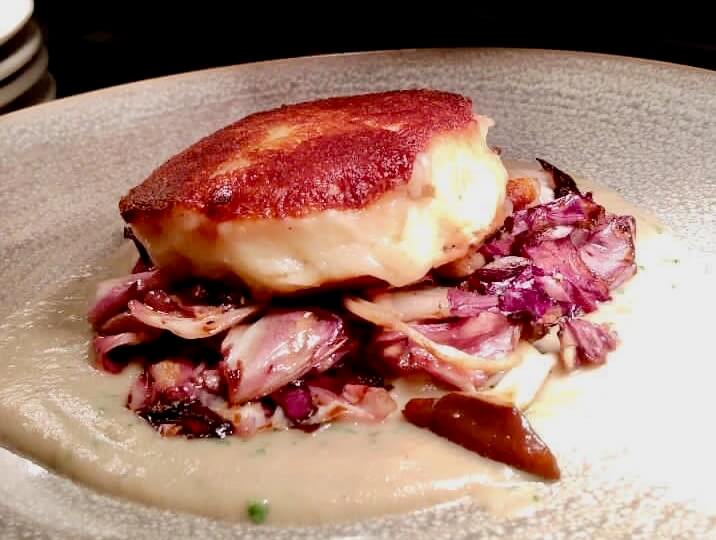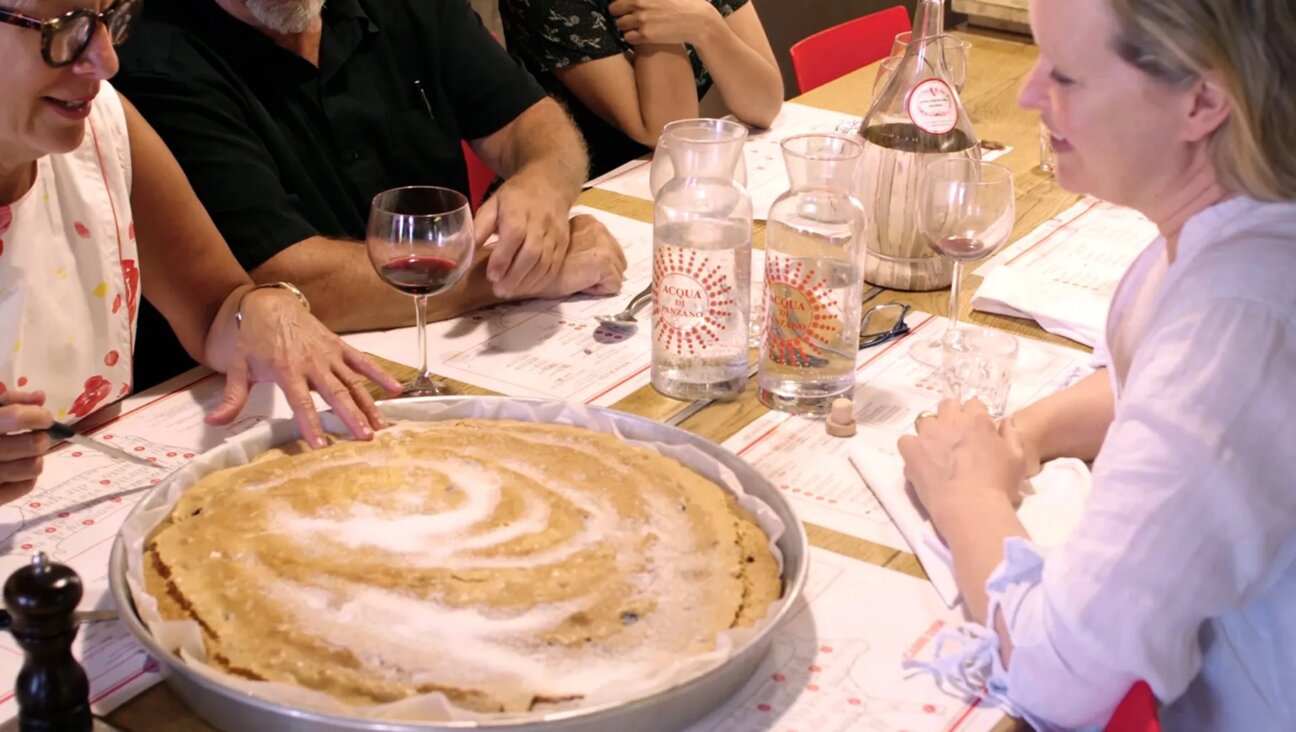The Spiritual Significance of the Seven Species Silan Cake

Image by Dahlia Klein
From Tu B’Shvat (Jewish Arbor Day), we may develop a clearer understanding that the well being of trees is intimately connected to the well being of all creation. From the point of view of practical Jewish philosophy and everyday living, the “Tree of Life” symbolizes the wisdom of the Torah: “Man is like a tree in the field (Deut. 20:19).” By extension, there is a remarkable degree of similarity between a person’s physical development — even his/her spiritual development, and that of a tree. We, too, have roots, which are the equivalent of our spiritual selves that one can’t see, possess a trunk as the body manifested in our physical selves, and produce fruit- our children.
Traditionally, Kabbalists, the ancient mystic Rabbis who deciphered the esoteric teachings of Judaism, use the tree metaphor to understand God’s relationship to the spiritual and physical worlds. According to Kabbalist thought, we attain a state of wholeness only when — like a tree — we bear fruit that affects our friends and neighbors in such a manner that they, too, are inspired to fulfill the purpose of their creation.
This is expressed during Tu B’Shvat by eating from the Shivat Haminim — the Seven Species of produce for which the Land of Israel is praised. Wheat and barley are the first two of the seven species, as it says: ”A land of wheat and barley, of vines, figs, and pomegranates, a land of olives and honey (Deut. 8:8).” This year I am baking a Silan (date honey) cake incorporating some the Shivat Haminim as a way to honor the day. This cake, will serve a conversation piece on Tu B’Shvat with children and guests in a fun and edible way, thereby affecting my family and friends in such a way that I hope will inspire them to learn and apply the wisdom of the Torah. The main ingredients in the Silan cake are wheat, barley, olive oil, dates, raisins, pomegranate, and almonds. Within each ingredient, we can delve into the spiritual significance of each species to elevate this Chag Ha’Ilanot to a spiritually transcending experience.
Wheat creates bread, which gives life and nourishment to us. This makes it possible for the soul (our spiritual selves) to dwell in the human body so that one can perform good deeds in this world. For those who traditionally could not afford to harvest wheat, the alternative was Barley, which in Biblical times, was the poor man’s staple and was food for livestock. Olives are a symbol for long life and everlasting life. Olive trees live longer than any other living organism on earth. It’s been claimed that an olive tree can live for up to four thousand years or more. In fact, the Sages taught: “Just as olive oil brings light into the world, so do the people of Israel bring light into the world (Midrash Shir HaShirim Raba 1:2).” Date palms are the most sustainable tree, where every part of the palm tree is utilized. The dates are for eating, the branches are for waving on Sukkot, the dried thatch is for roofing, the fibers are for ropes, the leaves are for sieves, and the truck is for house beams. Every part is used and represents every type of Jew. Together, we all form the Jewish nation, and each of us needs to be productive in serving a higher purpose. Grapes signify abundance and hope with its clusters of grapes. The mass of clusters represents a fruitful home that multiples in good deeds and future generations. Pomegranates signify mitzvot with its 613 seeds corresponding to the 613 mitzvot found in the Torah. Hard Shelled Nuts (Almonds) signify the hard shell that you must break away from yourself- the bad character traits (anger, impatience, etc.) that must be tossed away in a symbolic rebirth. The real you is the fruit… delicious and nourishing.
Eating is to the body what knowledge is to the soul. When we eat, we internalize the good part of the food- and through that we grow and develop. Similarly, when we learn a new piece of information, we must chew it over, digest it, integrate it into our very own being. Only then can we truly grow in wisdom and spirituality. Savor each bite of the cake or bread. Appreciate that God loves us and created everything for our good. Integrating the Shivat Haminim that Hashem blessed into this Silan Cake is a way to manifest, integrate, and grow from the wisdom of the Torah.
Silan Date Cake
Serves 2 (9-inch) loaf pans
Ingredients
3 cups All-Purpose Wheat Flour
½ cups barley flour
4 teaspoons ground cinnamon
1-teaspoon baking powder
1-teaspoon baking soda
½ teaspoon salt
½ teaspoon ground allspice
½ teaspoon ground cloves
4 eggs
½-cup light olive oil
½ cup vegetable oil
1-cup Silan honey
1-cup strong brewed coffee
1 cup POM (Pomegranate) juice
1-teaspoon vanilla extract
Zest of one lemon
1-cup raisins
½ cup almonds, slivered
¼ cup almonds, slivered for topping
1) Preheat oven to 350°F.
2) In a medium size bowl, sift together the all purpose flour, barley flour, cinnamon, baking powder, baking soda, salt, allspice and clove.
3) In a separate large bowl with an electric mixer, beat the eggs, gradually adding the Silan honey. Beat until thick and light in color, about 5 minutes. Whisk in the olive oil, vegetable oil, coffee, pomegranate juice, lemon juice, vanilla extract and lemon zest. The batter will be light and fluffy. Stir flour mixture slowly into batter. Fold in raisins and then mix in ½ cup almonds.
4) Oil the two loaf pans and line bottom with waxed paper. Oil again and fill each pan with batter up to one inch from the top. Bake for 30-40 minutes or until toothpick inserted comes out clean. Let cool 10 minutes and remove from pan.
Dahlia Klein is in the process of writing a vegetarian cookbook inspired from my Central Asia heritage. She teaches Challah Baking every Rosh Chodesh focusing on the spiritual significance of each ingredient used and tying it in with the festival of the month.

I hope you appreciated this article. Before you go, I’d like to ask you to please support the Forward’s award-winning journalism this Passover.
In this age of misinformation, our work is needed like never before. We report on the news that matters most to American Jews, driven by truth, not ideology.
At a time when newsrooms are closing or cutting back, the Forward has removed its paywall. That means for the first time in our 126-year history, Forward journalism is free to everyone, everywhere. With an ongoing war, rising antisemitism, and a flood of disinformation that may affect the upcoming election, we believe that free and open access to Jewish journalism is imperative.
Readers like you make it all possible. Right now, we’re in the middle of our Passover Pledge Drive and we still need 300 people to step up and make a gift to sustain our trustworthy, independent journalism.
Make a gift of any size and become a Forward member today. You’ll support our mission to tell the American Jewish story fully and fairly.
— Rachel Fishman Feddersen, Publisher and CEO
Join our mission to tell the Jewish story fully and fairly.
Only 300 more gifts needed by April 30
























